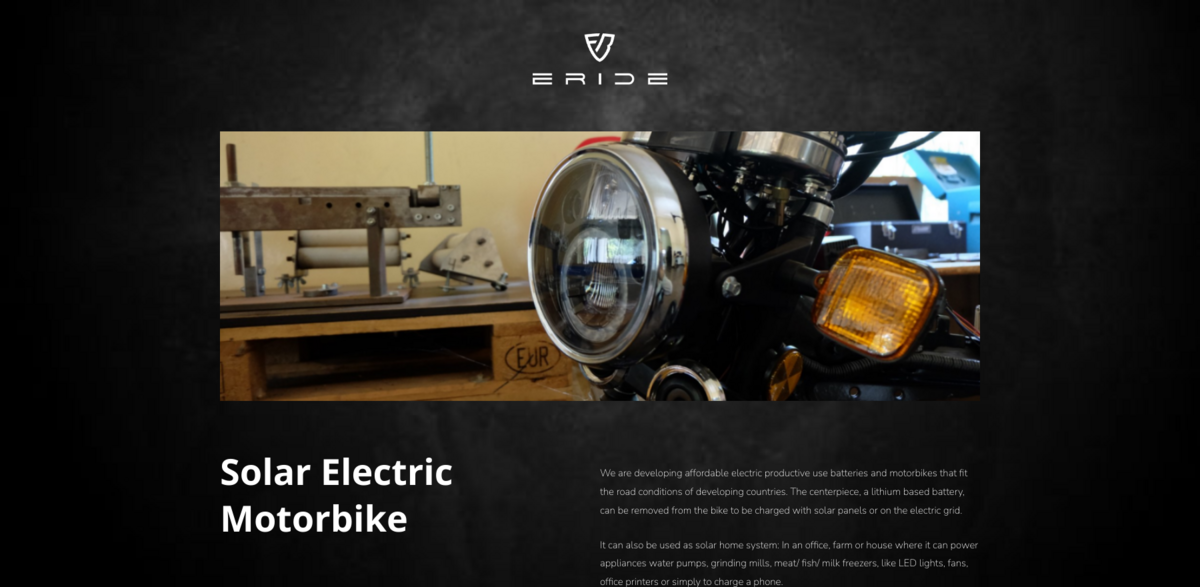What is the Solar Electric Motorbike Project?
The Solar Electric Motorbike project is all about creating affordable electric motorbikes and productive use batteries tailored for the road conditions in developing countries. At the heart of this innovation is a lithium-based battery that’s removable—meaning it can be charged either with solar panels or plugged into the electric grid. But here’s the cool part: this battery isn’t just for the bike. It doubles as a solar home system, powering everything from LED lights and fans to water pumps, grinding mills, and even meat, fish, or milk freezers. Whether it’s an office, a farm, or a house, this system can keep essential appliances running or simply charge a phone. Pretty versatile, right?
Main Benefits of the Project
Here are some key facts and figures that highlight why this project matters:
- Designed specifically for the challenging road conditions of developing countries.
- Uses a lithium-based battery that’s removable and multi-functional.
- Battery can be charged via solar panels or the electric grid, offering flexibility.
- Supports a wide range of appliances: water pumps, grinding mills, freezers, LED lights, fans, office printers, and phone chargers.
- Two years of testing completed, with a larger pilot project planned for Sub-Saharan Africa this summer.
Current Development Focus
The project is still under development, with several exciting features in the works. Solar charging technology is being refined to maximize efficiency. A battery management system is being designed to ensure safety and longevity. Remote monitoring capabilities are also being developed, allowing users and operators to keep an eye on battery status and performance from afar. And, of course, vehicle design is continuously evolving to better suit the unique needs of users in these regions.
Pilot Project Plans
After two years of rigorous testing, the team is gearing up for a larger pilot project in Sub-Saharan Africa, scheduled for this summer. This phase will be crucial to understand how the motorbikes and batteries perform in real-world conditions and to gather feedback from users. It’s an exciting step that could pave the way for wider adoption and impact.
Meet the Team Behind the Innovation
The project is driven by a diverse and skilled team bringing together expertise from different fields. Kayooka Balamani, with an MBA in Finance and Accounting based in Lusaka, handles the financial and operational aspects. Tamara Tursijan, holding an MSc in Energy Technology from ETH Zürich, contributes deep technical knowledge. Jacob Anz, also from ETH Zürich with an MSc in Environmental Engineering, brings environmental insights to ensure the project’s sustainability. Together, they’re combining their strengths to make this vision a reality.
Project Impact and Sustainable Development Goals
- SDG 7: Affordable and Clean Energy – promoting access to reliable, sustainable energy.
- SDG 8: Decent Work and Economic Growth – enabling productive use and economic opportunities.
- SDG 9: Industry, Innovation, and Infrastructure – fostering innovation in transport and energy.
- SDG 11: Sustainable Cities and Communities – improving mobility and energy access.
- SDG 13: Climate Action – reducing reliance on fossil fuels through solar energy.
Contact and Location
The project is based in Lusaka, Zambia, under the organization ERIDE Zambia. Their office is located at 11878 Off Kasangula Road, Olympia Lusaka. This local presence is key to understanding and addressing the specific challenges faced by communities in the region, ensuring the solutions are practical and impactful.


















